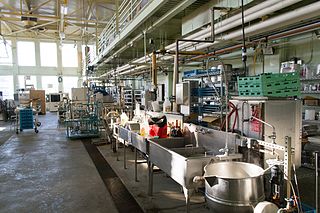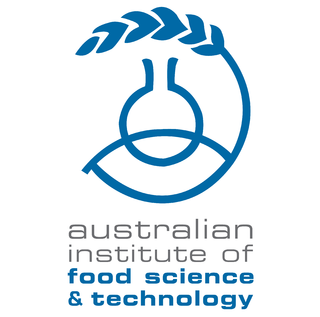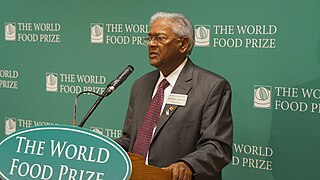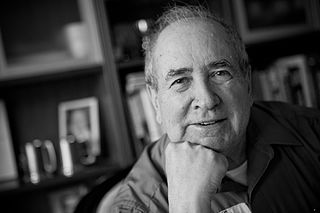
Food science is the basic science and applied science of food; its scope starts at overlap with agricultural science and nutritional science and leads through the scientific aspects of food safety and food processing, informing the development of food technology.
The Nicolas Appert Award is awarded by the Chicago Section of the Institute of Food Technologists for preeminence in and contributions to the field of food technology. The award has been given annually since 1942 and is named after Nicolas Appert, the French inventor of airtight food preservation. Award winners receive a bronze medal with a front view of Appert and a $5000 honorarium. This is considered one of the highest honors in food technology.

The Institute of Food Technologists (IFT) is an international, non-profit scientific society of professionals engaged in food science, food technology, and related areas in academia, government and industry. It has more than 17,000 members from more than 95 countries.
The Chinese American Food Society (CAFS) is an American-based organization founded in 1974 to develop relationships among Chinese-born food scientists in academia, government, and industry. Its current president is Yao Olive Li, a professor at California State Polytechnic University, Pomona.
Susan Lynn Hefle was an American food scientist who specialized in food allergens, specifically their detection and safety. Hefle was also a cyclist and a cyclist judge.
The Myron Solberg Award has been awarded every year since 2004 by the Institute of Food Technologists (IFT). It is awarded for leadership in establishing, successfully developing, and continuing a cooperative organization involving academia, government, and industry. The award is named for Myron Solberg (1930-2001), a food science professor at Rutgers University who founded the institution Center for Advanced Food Technology in 1984 and headed the center until his 2000 retirement.

Samuel Cate Prescott was an American food scientist and microbiologist who was involved in the development of food safety, food science, public health, and industrial microbiology.

Phi Tau Sigma (ΦΤΣ) is the Honor Society for food science and technology. The organization was founded in 1953 at the University of Massachusetts Amherst by Dr. Gideon E. (Guy) Livingston, a food technology professor. It was incorporated under the General Laws of the Commonwealth of Massachusetts December 8, 1953, as "Phi Tau Sigma Honorary Society, Inc."
Marcel Loncin was a Belgian-born, French chemical engineer who was involved in food engineering throughout his career.
Philip E. Nelson is an American food scientist who is best known for his work in bulk aseptic processing and packaging of food and the use of chlorine dioxide gas and hydrogen peroxide liquid to commercially sterilize food products and food contact surfaces. He was the Scholle Chair and Professor in Food Processing at the Department of Food Science at Purdue University. Aseptic processing and packaging would be involved in the relief efforts following the 2004 Indian Ocean earthquake and Hurricane Katrina in 2005.

The Australian Institute of Food Science and Technology Incorporated (AIFST) is a national, not-for-profit industry body representing individuals from all sectors of the food science and technology industry.
John Joseph Powers was an American food scientist who was involved in the creation of the Food Science Department at University of Georgia in Athens, GA. He also served as President of the Institute of Food Technologists (IFT) in 1986-87 and was Editor of the Journal of Food Science and "Journal of Food Quality.
Nevin Stewart Scrimshaw was an American food scientist and Institute Professor emeritus at the Massachusetts Institute of Technology. Scrimshaw was born in Milwaukee, Wisconsin. During the course of his long career he developed nutritional supplements for alleviating protein, iodine, and iron deficiencies in the developing world. His pioneering and extensive publications in the area of human nutrition and food science include over 20 books and monographs and hundreds of scholarly articles. Scrimshaw also founded the Department of Nutrition and Food Science at the Massachusetts Institute of Technology, the Institute of Nutrition of Central America and Panama, and the Nevin Scrimshaw International Nutrition Foundation. He was awarded the Bolton L. Corson Medal in 1976 and the World Food Prize in 1991. Scrimshaw spent the last years of his life on a farm in Thornton, New Hampshire, where he died at 95.
Nergis Mavalvala is a Pakistani-American astrophysicist known for her role in the first observation of gravitational waves. She is the Curtis and Kathleen Marble Professor of Astrophysics at the Massachusetts Institute of Technology (MIT), where she is also the Dean of the university's School of Science. She was previously the Associate Head of the university's Department of Physics She was awarded a MacArthur Fellowship in 2010.

Dr. Sanjaya Rajaram (1943–2021) was an Indian-born Mexican scientist and winner of the 2014 World Food Prize. He was awarded this prize for his scientific research in developing 480 wheat varieties that have been released in 51 countries. This innovation has led to an increase in world wheat production – by more than 200 million tons – building upon the successes of the Green Revolution. The Government of India awarded him highest civilian awards Padma Shri (2001) and Padma Bhushan (2022).
Vishweshwaraiah Prakash is an Indian structural biologist, food technologist and a former director-general designate of the Council of Scientific and Industrial Research (CSIR). He is a former director of the Central Food Technological Research Institute (CFTRI), Mysore and was involved with the International Union of Food Science and Technology as the chairman of its International Academy during 2008-10. He received the Shanti Swarup Bhatnagar Prize, the highest Indian award in the science and technology category in 1996. The Government of India awarded him the fourth highest civilian honour of the Padma Shri in 2004,

Neena Gupta is a professor at the Statistics and Mathematics Unit of the Indian Statistical Institute (ISI), Kolkata. Her primary fields of interest are commutative algebra and affine algebraic geometry.

Aaron Leo Brody was an American food scientist, who developed new technologies in food processing and packaging. He created the first frozen fish sticks in the 1950s. Later, Brody served as an adjunct professor at the University of Georgia.
Bhaskar Dattatraya Kulkarni (1949–2019), popularly known as B. D. among his friends and colleagues, was an Indian chemical reaction engineer and a Distinguished Scientist of Chemical Engineering and Process Development at the National Chemical Laboratory, Pune. An INSA Senior Scientist and a J. C. Bose fellow, he was known for his work on fluidized bed reactors and chemical reactors. He is an elected fellow of the Indian Academy of Sciences, Indian National Science Academy, The World Academy of Sciences and the Indian National Academy of Engineering. The Council of Scientific and Industrial Research, the apex agency of the Government of India for scientific research, awarded him the Shanti Swarup Bhatnagar Prize for Science and Technology, one of the highest Indian science awards for his contributions to Engineering Sciences in 1988.
Louise Slade was a food scientist known for her work on food polymer science. She was an elected fellow of the Institute of Food Technologists and of the American Association of Cereal Chemists.







